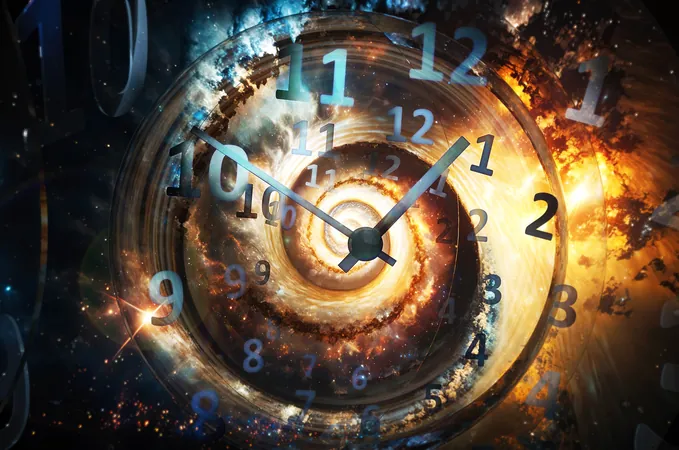
Shattering the Illusion: Is Time Just a Byproduct of Human Perception?
2025-01-11
Author: Ting
Time is a concept that feels as ubiquitous as the air we breathe. We rely on clocks, calendars, and daily schedules to structure our lives. Yet, a provocative debate is brewing among physicists suggesting that time may not exist in the way we perceive it. In a world where events follow one another in a linear fashion, some researchers argue that time could be an illusion—a mere trick of human perception.
The Perception of Time: A Cognitive Illusion?
Everyday life hinges on our understanding of past, present, and future. From paying our bills accurately to setting alarms for early morning wake-ups, our actions are grounded in a belief in an orderly flow of time. However, renowned physicists like Dr. Carlo Rovelli are challenging this perspective. Known for his work in loop quantum gravity, Dr. Rovelli suggests that our shared notion of time may not hold up under rigorous scrutiny, and he often omits a global time parameter in his theories.
Einstein's Groundbreaking Insights
The roots of this discussion can be traced back to Albert Einstein, whose revolutionary theories shattered former conceptions of time. In his special theory of relativity, he posited that time differs for observers in different frames of reference. For instance, a person traveling at high speeds or in a stronger gravitational field will experience time at a different rate than someone stationary in a weaker gravitational field. This phenomenon is known as time dilation and has practical implications demonstrated by technology like GPS satellites.
Einstein’s general theory of relativity further expanded this idea, revealing that gravity not only affects motion but also the very flow of time. The stronger the gravitational force, the more it slows time—an idea that forces us to question our intuition about time as a steadfast backdrop.
Quantum Mechanics Adds Complexity
The realm of quantum mechanics introduces even further complications to our understanding of time. Conventional models treat time as a fixed backdrop, but observations in quantum physics suggest otherwise. For instance, the Wheeler-DeWitt equation simplifies the universe by eliminating time from the equation, focusing instead on the relationships and correlations among different physical states.
This indicates that perhaps time is not a fundamental aspect of the universe but an emergent property arising from the interactions of particles—a notion that continues to baffle physicists.
The Arrow of Time: A Statistical Trend
Despite challenges to the existence of time as we know it, our daily experiences support the idea of an undeniable “arrow of time.” We witness events unfold in one direction: eggs break rather than un-break, and sugar dissolves rather than spontaneously reconstituting itself. This observation is tied to the second law of thermodynamics, which states that entropy, or disorder, tends to increase in isolated systems over time. In essence, the progression from order to disorder correlates with our perception of time moving forward.
Time: A Human Construct?
What if, in the grand tapestry of the universe, time is merely a construct—a clever accounting device essential for human understanding? Some thinkers argue that our perception of time, with its relentless forward momentum, is deeply rooted in our cognitive processes. It remains a topic of incessant speculation why our brains cling to the fleeting nature of time, even as we ponder its possible non-existence.
Looking to the Future
As discussions on the reality of time evolve, one must wonder: Could humanity's understanding of time fundamentally shift in the coming years? Will future generations evolve to perceive time differently, or are we destined to remain tethered to our current understanding?
In the end, whether time is an intrinsic element of the universe or merely a byproduct of human cognition, we continue to navigate our lives as though each moment matters—because even if time may not exist in the way we think, the human experience feels undeniably tied to its relentless passage.
Stay tuned, as the exploration of time, perception, and reality unfolds—who knows what fascinating revelations await just around the corner?


 Brasil (PT)
Brasil (PT)
 Canada (EN)
Canada (EN)
 Chile (ES)
Chile (ES)
 Česko (CS)
Česko (CS)
 대한민국 (KO)
대한민국 (KO)
 España (ES)
España (ES)
 France (FR)
France (FR)
 Hong Kong (EN)
Hong Kong (EN)
 Italia (IT)
Italia (IT)
 日本 (JA)
日本 (JA)
 Magyarország (HU)
Magyarország (HU)
 Norge (NO)
Norge (NO)
 Polska (PL)
Polska (PL)
 Schweiz (DE)
Schweiz (DE)
 Singapore (EN)
Singapore (EN)
 Sverige (SV)
Sverige (SV)
 Suomi (FI)
Suomi (FI)
 Türkiye (TR)
Türkiye (TR)
 الإمارات العربية المتحدة (AR)
الإمارات العربية المتحدة (AR)